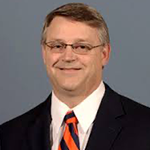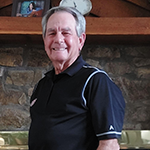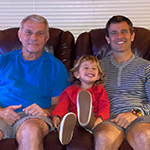 In observance of National Cancer Prevention Month in February, three UAB patients share their experiences about how getting recommended prostate screenings helps save lives.
In observance of National Cancer Prevention Month in February, three UAB patients share their experiences about how getting recommended prostate screenings helps save lives.
The second leading cause of cancer mortality in men is prostate cancer. Researchers have found that approximately 1 in 8 men will be diagnosed with a form of prostate cancer in their lifespan. It is estimated that over 265, 000 men will be diagnosed in the United States in 2022, and over 34,000 of those cases will result in death. As the first medical center in Alabama to offer MRI/US fusion-guided prostate biopsy technique, UAB Medicine urologists serve as regional and national leaders in prostate cancer care and treatment. The Program for Personalized Prostate Cancer Care is a part of the O’Neal Comprehensive Cancer Center at UAB and offers the latest, minimally-invasive treatment options for referring patients. With prostate cancer becoming more easily detectable with early screenings, physicians can provide a wider variety of treatment plans and options for patients.
When discussing cancer prevention, each patient maintains the same core piece of advice to others:
Go get your yearly recommended screenings.
Former Auburn athlete and professional football coach receives diagnosis
Alabama native Doug Goodwin has had a long, successful career coaching football for about three decades. He was named the Alabama Football Coaches Association State Coach of the Year in 2008 and was elected to the AHSAA Sports Hall of Fame in 2015. Goodwin has always led an active lifestyle, going from collegiate athlete to a career football coach, and has no known family history of prostate or breast cancer.
After going to see his primary physician, Dr. James Davis of UAB Primecare for his yearly physical and screenings, Goodwin’s blood test came back with an elevated prostate-specific antigen (PSA) blood test level. PSA is a protein found in the prostate gland, and certain levels can indicate whether or not there may be a prostate-related issue such as cancer. Goodwin’s PSA was found to be above the 4.0 ng/mL “normal” range, and his doctor recommended he seek additional testing.
“I wasn’t worried at first about the (PSA) results, but I was surprised when the biopsy results came back positive, especially because of my family (medical) history,” said Goodwin, “It’s puzzling because you can’t pinpoint ‘why did this happen?’”
Goodwin was then referred to UAB urologist, Soroush Rais-Bahrami, M.D. after having an MRI and receiving a prostate cancer diagnosis with a Gleason score of 7, used to grade prostate cancers.
“I felt totally fine, but I knew they were recommending what I needed to do, and I wanted to tackle it,” said Goodwin when they gave him his treatment options and decided to undergo surgery.
Dr. Rais- Bahrami performed a robotic radical prostatectomy and bilateral pelvic lymph node dissection on Goodwin earlier this year. Shortly after surgery, Goodwin said he started to show up to practice again and felt better each day. After returning for follow-up appointments, tests now show that Goodwin is prostate cancer free.
Goodwin said that the best part of the outcome was hearing the news that he is now clear, and urges others to start receiving recommended screenings upon reaching middle age. It is generally recommended by medical professionals that men start receiving annual screenings by the age of 55, and in some cases with higher risk even as early as 40 years old.
When asked about what advice Goodwin would others regarding yearly recommended screenings, Goodwin said, “Be proactive! Things can change pretty quickly, and just because you feel fine, doesn’t mean you are fine.”
Goodwin is currently fulfilling his commitment and lifelong passion of working as head football coach at Jackson Preparatory School in Jackson, Mississippi.
Active and healthy retired business owner advocates for his health
Joe Cherry received his first prostate cancer diagnosis about 12 years ago and after receiving radiation treatment, he went into remission. While going to his yearly check-up three years ago, Cherry’s primary doctor found that his PSA levels had risen to an alarming level despite previous prostate cancer treatment. His physician suggested that Cherry start receiving hormone injections after a PET scan revealed a spot on his prostate. Upon learning about the potential side effects of the injection series, Cherry decided to do some further research on treatment options best suited to his personal needs.
After reaching out to multiple institutions and sources, Cherry heard that it is sometimes more difficult to receive insurance coverage for surgical prostate cancer treatment for those over the age of 80 years old. However, he believed there was a far more minimally invasive procedure somewhere, and that is when Cherry’s primary care doctor referred him to Jeffrey Nix, M.D., a UAB urologist who specializes in these types of procedures.
 “The only thing that stayed in my mind was finding the right treatment for myself,” said Cherry.
“The only thing that stayed in my mind was finding the right treatment for myself,” said Cherry.
After Cherry’s biopsy results indicated that there was only one spot in the prostate gland, and his cancer had not yet spread, Nix performed an ultrasound-guided percutaneous focal ablation of the prostate tumor tissue using irreversible electroporation (IRE). This particular treatment uses electrical probes with a current that shrinks the cancer tissue and is proven to be a highly effective procedure for many diseases.
Cherry said he is pleased so far with the results post-surgery as well as UAB’s dedication to providing comprehensive, individualized care for its patients. He felt that his opinion and personal research finally mattered even to the multiple expert providers who gave him consultations during his visits to UAB.
Cherry is currently in remission and receiving follow-up care at UAB. The most important advice he can give others diagnosed with a life-threatening disease is to be “diligent and not always take the advice from the first person. Find a facility that has what you need.”
Auburn academic professor does his homework
Hubert Feild, Jr., Ph.D., is a longtime professor and researcher of psychology, legal issues, and personnel selection at Auburn University. After consistently going to his yearly recommended medical screenings with his primary care doctor in Opelika, Alabama, Feild received harrowing news. After receiving higher-than-normal PSA blood test results for his demographic, indicating that he may have prostate cancer, Feild’s primary physician recommended that he go to see a urologist for a more specialized opinion and treatment plan.
Feild knew that he wanted to go to a teaching university for the most cutting-edge treatments available, and proceeded to research every available option to steer him toward the right institution. After being referred to Soroush Rais-Bahrami, M.D., Feild diligently read through his publications and postdoctoral experience and said it did not take long for him to decide to move forward with meeting Rais- Bahrami.
Upon meeting Rais- Bahrami, Feild said that Rais-Bahrami surprised him with how intentional he was about taking notes and recording everything he had to say.
“(Dr. Rais-Bahrami) was the first physician that made me feel like ‘I hear you. I want to listen. I’m here for you.’ And I was very impressed by that,” said Feild.
After receiving confirmation from the biopsy results, Rais- Bahrami sat down with Feild and discussed the wide assortment of options for treating his prostate cancer. Feild said that it was evident to both of them that surgery was the most effective and efficient answer to his case.
“The confidence that Dr. Rais-Bahrami exuded in me prevented me from being scared or depressed about my situation. He even gave me his personal cell phone number so I could follow up with him and ask questions during my treatment. I wanted someone to hold my hand. (UAB Medicine) held my hand,” Feild said of his experience.
Feild’s surgery was scheduled in the weeks following, and Rais- Bahrami performed a robotic radical prostatectomy with bilateral pelvic lymph node dissection. He is feeling well after the procedure with minimal side effects and continues to return to UAB for post-surgery follow-up appointments, each confirming he remains cancer free.
When asked what Feild would recommend to others in his situation, he said, “Get tested and keep track of the results. Understand what things mean by educating yourself about your body. Remember that genetics don’t always play the sole role in future diagnoses, and it’s always important to share the information you learn with others.”